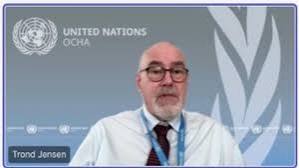By our Correspondent
United Nations Office for the Coordination of Humanitarian Affairs has disclosed that the 2025 humanitarian intervention in Nigeria will require $910m, spanning nine sectors.
During a virtual meeting, UNOCHA’s Head of Office, Mr Trond Jensen, highlighted the ongoing humanitarian crisis in Borno, Adamawa, and Yobe states.
He described the situation as dire, citing conflict, displacement, and severe livelihood disruptions as key challenges.
The meeting, which aimed to address these issues ahead of the January 23, 2025, launch of the Nigeria Humanitarian Needs and Response Plan ,HNRP, in Abuja, saw Jensen emphasizing that humanitarian funding alone cannot resolve the underlying problems.
“Even if a lot of money has been disbursed for humanitarian interventions, it doesn’t mean it will solve the underlying needs”, Jensen said.
According to projections, 7.8 million people in BAY states will require humanitarian assistance in 2025. Of these, 3.6 million individuals, about 46.15% of the total are expected to benefit from the $910m intervention.
Jensen explained, “In 2025, an estimated 7.8 million women, men, and children across BAY states will require humanitarian assistance. Over 1.8 million have been displaced by violence, 1.4 million have returned home but lack essential services, and 4.6 million are host community members facing the impact of the conflict”.
A breakdown of the sectors according to the funding allocated to the BAY states showed that food and security would gulp $352.2m representing 38.7% of the total funding while nutrition is to get $132.1m.
In addition, he said the sum of $45m would be channelled towards anticipatory action, while 1.3% of the total sum at $12m would be used to address Multi-Purpose Cash in 2025.
Subsequently, he said $115.7m is expected to address “Others” expenses in the BAY states.
Jensen further highlighted the compounding crises in the region. “Insecurity, including predatory assaults targeting civilians, has claimed thousands of lives, displaced over 2 million individuals, and destroyed critical infrastructure.
“Floods and natural disasters have worsened the situation, increasing protection risks and exacerbating food insecurity.
“Meanwhile, economic challenges like inflation and currency devaluation have deepened vulnerabilities, putting basic necessities out of reach for many families”.
Jensen identified key obstacles to humanitarian progress, including funding gaps, insecurity, bureaucratic hurdles, and resistance to reform.
He called for a coordinated approach to address urgent needs and foster resilience.





